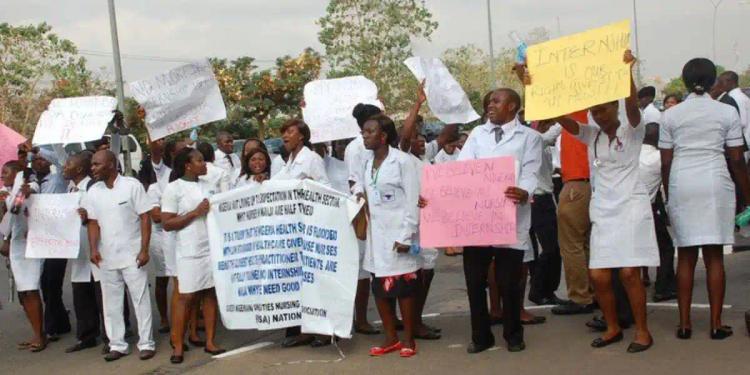Now Reading: 5 Reasons Nigerian Nurses and Midwives Keep Going on Strike
-
01
5 Reasons Nigerian Nurses and Midwives Keep Going on Strike
5 Reasons Nigerian Nurses and Midwives Keep Going on Strike

The Nigerian nurses and midwives strike has become a recurring headline across the country’s health sector, revealing deeper problems plaguing the system. From Lagos to Zamfara, these essential healthcare workers have repeatedly withdrawn their services, citing long-standing grievances that remain unresolved.
While the headlines often report these strikes as brief interruptions, the real impact goes beyond temporary hospital shutdowns, it speaks to the persistent neglect of frontline healthcare workers. In this article, we explore five major reasons Nigerian nurses and midwives keep going on strike, how it affects everyday Nigerians, and what policymakers must urgently address to curb the crisis

1. Poor Remuneration and Wage Disparities
One of the foremost reasons for the frequent strikes is the chronic underpayment of nurses and midwives. Despite carrying heavy workloads, many earn far below a living wage. In several states, public sector nurses receive monthly salaries below ₦70,000, which barely covers basic family needs.
The National Bureau of Statistics (NBS) reported that the healthcare sector ranks among the least remunerated public sectors in Nigeria, especially at the entry-level. In contrast, health professionals in other countries, particularly in the UK and Canada are significantly better paid, which fuels the ongoing mass migration of Nigerian nurses abroad.
“We risk our lives daily, yet can barely afford basic living expenses,” said Amaka E., a nurse at a public hospital in Enugu.
This wage disparity both across professions and across Nigerian states continues to push nurses toward industrial action.
2. Poor Working Conditions and Unsafe Environments
From broken hospital beds to expired medical gloves, many Nigerian nurses and midwives work in substandard environments that compromise both their safety and that of their patients.
In several primary health centres, especially in rural areas, there is no running water, functional electricity, or even emergency equipment. This makes it almost impossible for midwives to conduct safe deliveries, particularly at night.
According to a World Health Organization (WHO) assessment, Nigeria falls far below the recommended nurse-to-patient ratio of 1:5, with some facilities recording ratios as high as 1:25 or more. Such overload contributes to fatigue, reduced quality of care, and preventable deaths.
In Borno, a midwife was once abducted by insurgents while working in a remote clinic without security highlighting the extremes of workplace danger many endure.
READ ALSO: National Relief as Nigerian Nurses And Midwives Suspend Planned Nationwide Strike
3. Lack of Career Progression and Professional Recognition
While doctors and administrators often climb the career ladder quickly, nurses and midwives remain stagnant, sometimes working for over a decade without promotion.
A large percentage of them are excluded from postgraduate opportunities, research grants, or policy decision-making roles despite being the ones at the heart of patient care.
“Despite being the heartbeat of hospitals, our voices are rarely heard,” lamented a senior matron in Abuja.
This lack of upward mobility and institutional recognition significantly affects morale and professional pride, prompting workers to demand better through organized strikes.
4. Delayed and Irregular Payment of Allowances
Nurses and midwives in Nigeria are entitled to various allowances, hazard pay, night shift bonuses, rural duty compensation, but these are often delayed or not paid at all.
During the COVID-19 pandemic, for example, many nurses reported that they never received promised hazard allowances, even after contracting the virus on duty.
The situation is worse in rural postings, where midwives have gone months without receiving basic duty allowances, despite working in high-risk or underserved communities.
This financial injustice, added to poor salaries, forces many to walk off the job in protest.
READ ALSO: Awujale of Ijebuland: 5 Things You Don’t Know About the Late Oba Sikiru Kayode Adetona
5. Failure of Dialogue and Broken Agreements
Perhaps the most persistent frustration lies in broken promises and unfulfilled agreements. Many strikes were previously suspended based on Memoranda of Understanding (MoUs) signed between the government and the unions, yet months later, nothing changes.
The National Association of Nigeria Nurses and Midwives (NANNM) has repeatedly accused both state and federal authorities of failing to implement agreements reached in previous negotiations, forcing them to return to the streets.
“We’re tired of negotiating the same issues over and over. Government only listens when we withdraw our services,” said a NANNM representative during a protest in Benin.
This repetitive pattern of delay and denial has led to deep-seated mistrust and the normalization of strikes as a last resort for demanding action.
These strikes are not acts of sabotage, they are cries for justice from a workforce that is tired, neglected, and underappreciated. Nigerian nurses and midwives form the backbone of maternal, emergency, and rural healthcare delivery, yet their needs continue to be sidelined.
If Nigeria hopes to achieve Universal Health Coverage (UHC) and reduce its maternal mortality rate, then prioritizing the welfare of nurses and midwives is not just important—it’s essential.
Until better salaries, safer work conditions, clear career paths, and trustworthy negotiations become a reality, these healthcare strikes will continue to reflect the deeper fractures in Nigeria’s health sector.





